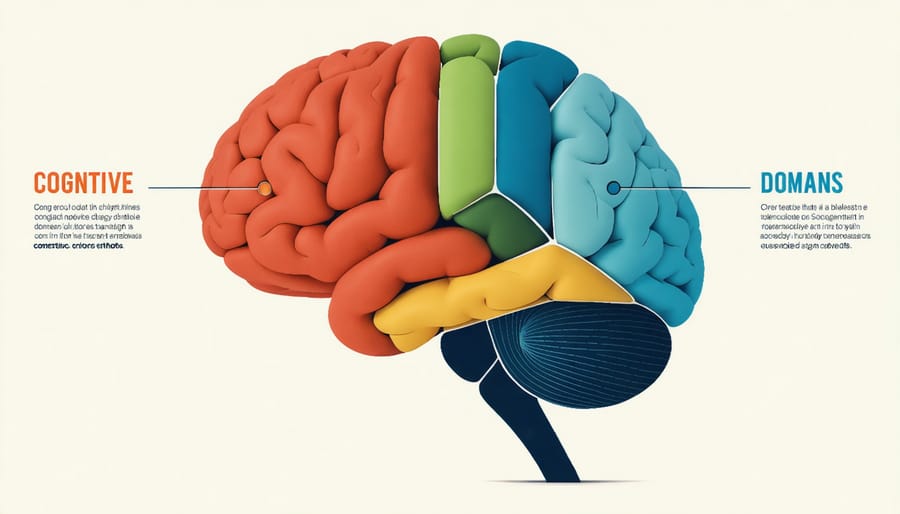Understanding your brain’s five cognitive domains empowers you to take control of your mental well-being, especially when managing cognitive changes in chronic conditions. These essential brain functions—attention, memory, executive function, language, and visuospatial skills—work together to help you navigate daily life, from remembering medication schedules to making complex decisions about your health care. For Albertans managing chronic conditions, recognizing how these domains affect daily functioning opens the door to practical strategies for maintaining mental sharpness. Whether you’re concerned about brain health or actively managing a condition, understanding these cognitive domains provides a foundation for taking meaningful steps toward better mental wellness. By focusing on these five areas, you can work with healthcare providers to develop targeted approaches that enhance your quality of life and support your overall health journey.

Memory and Chronic Disease: A Two-Way Street
How Diabetes Impacts Your Memory
Diabetes can significantly affect your memory function in several ways. When blood sugar levels fluctuate, it can disrupt how your brain processes and stores information. Think of it like trying to run your smartphone with an unstable power source – sometimes it works perfectly, other times it struggles to perform basic tasks.
Many Albertans living with diabetes report experiencing “brain fog,” especially when their blood sugar is too high or too low. This can make it harder to remember appointments, medication schedules, or even recent conversations. The good news is that maintaining stable blood sugar levels through proper diabetes management can help protect your memory.
Simple strategies like keeping a daily routine, using smartphone reminders, and breaking tasks into smaller chunks can help compensate for memory challenges. Regular physical activity, such as walking in Edmonton’s river valley or cycling through Calgary’s pathway system, also supports both blood sugar control and better memory function.
Consider working with your healthcare team to develop a personalized plan that addresses both your diabetes and memory concerns.
Memory-Boosting Strategies for Disease Management
Keeping your memory sharp while managing chronic conditions doesn’t have to be complicated. Start by creating a dedicated spot for your health information – a simple notebook or digital app can work wonders. Break down complex medical instructions into smaller, manageable steps and use visual aids like charts or calendars to track your medications and appointments.
Try linking new health information to things you already know well. For example, if you need to take medication at breakfast, associate it with your morning coffee routine. Engage multiple senses by speaking instructions aloud while writing them down, or create memorable rhymes for important health reminders.
Make technology work for you by setting smartphone alerts for medications and appointments. Join local memory enhancement programs at Alberta’s community centers, where you can learn new techniques while connecting with others. Remember to get adequate sleep, stay physically active, and maintain social connections – these habits naturally support both memory function and overall health management.
Attention: Your Brain’s Disease-Fighting Ally
Why Attention Matters in Disease Management
When managing a chronic condition, your ability to pay attention plays a crucial role in your daily health routine. Think about following medication schedules, monitoring symptoms, or maintaining a healthy diet – these all require sustained focus and attention. Many Albertans find that keeping track of multiple medications or remembering to check blood sugar levels throughout the day can be challenging.
Good attention skills help you stay on top of your treatment plan and notice early warning signs that might indicate a change in your condition. For example, being attentive helps you recognize subtle symptoms, remember to take medications at the right times, and maintain important lifestyle changes like regular exercise or dietary restrictions.
If you’re finding it difficult to stay focused on your health routine, try using practical tools like medication organizers, phone reminders, or keeping a health journal. These aids can help support your attention system and make managing your condition easier.
Simple Ways to Improve Your Focus
Improving your focus doesn’t require drastic lifestyle changes. Start by creating a dedicated workspace free from distractions like phones and social media notifications. Take regular breaks using the “25/5 rule” – work for 25 minutes, then rest for 5 minutes to maintain mental freshness.
Simple exercises can boost your attention span throughout the day. Try mindful breathing for 2-3 minutes between tasks, or practice the “one thing at a time” rule by fully completing one task before moving to the next. Getting enough sleep, staying physically active, and maintaining proper nutrition also play crucial roles in supporting attention.
Many community centers in Alberta offer meditation and mindfulness classes that can help strengthen your focus. Consider joining a local group or downloading meditation apps to guide your practice. Remember, like any skill, focus improves with consistent practice and patience.
For those working from home, establish clear boundaries between work and personal time to help maintain better concentration during important tasks.
Language Skills and Health Communication
Better Communication, Better Health Outcomes
Clear communication with healthcare providers plays a vital role in managing chronic conditions effectively. Strong language skills help you accurately describe symptoms, understand treatment instructions, and actively participate in your healthcare decisions. Research shows that patients who communicate well with their healthcare team often experience better health outcomes and fewer complications.
Just as mental patterns in disease management affect your health journey, your ability to express yourself clearly can make a significant difference in your care quality. Here in Alberta, you can improve your healthcare communications by:
• Taking notes before appointments to organize your thoughts
• Asking questions when you don’t understand something
• Repeating instructions back to your healthcare provider
• Using specific examples to describe your symptoms
• Bringing a trusted friend or family member to appointments if needed
Many Alberta Health Services locations offer interpreter services and communication assistance programs. Don’t hesitate to ask for these resources if English isn’t your first language or if you need extra support in expressing your health concerns.
Remember, effective communication is a two-way street. Your healthcare team wants to understand your needs, and you deserve to understand your care plan fully. Being proactive about clear communication helps ensure you receive the most appropriate and effective treatment for your condition.
Executive Function: Your Health Management System
Planning and Organization in Disease Management
Good planning and organization skills are essential for managing chronic health conditions effectively. When you can organize medication schedules, track symptoms, and plan healthy meals, you’re better equipped to maintain your health. These executive function skills help you create and stick to treatment routines, remember doctor’s appointments, and make informed decisions about your health care.
For Alberta residents, this might mean organizing regular check-ups with healthcare providers, planning outdoor activities during our warmer months, and preparing for seasonal health challenges. Setting up medication reminders, using health tracking apps, or keeping a symptom diary are practical ways to stay on top of your health management.
When you strengthen these organizational skills, you’re more likely to follow through with treatment plans and maintain healthy habits. Simple strategies like using a weekly pill organizer, keeping a health calendar, or setting phone reminders can make a significant difference in managing your condition effectively.

Strengthening Your Executive Function
There are several effective ways to strengthen your executive function skills, which become especially important when managing chronic conditions. Start by breaking large tasks into smaller, manageable steps – this helps reduce overwhelm and improves organization. Create daily routines and use tools like calendars, reminder apps, or to-do lists to stay on track with medications and appointments. Practice mindfulness meditation for 10-15 minutes daily, as research shows it enhances focus and decision-making abilities. Since stress affects brain function, incorporate stress-management techniques like deep breathing or gentle yoga. Join local brain training programs at Alberta community centers, which offer structured activities to boost planning and problem-solving skills. Try activities like puzzles, strategy games, or learning a new hobby – these challenge your brain and build cognitive resilience. Remember to start small and gradually increase complexity as you build confidence.

Visual-Spatial Skills and Daily Health Management
Managing Medications and Reading Health Information
Visual-spatial skills play a vital role in managing your daily health routine, especially when it comes to medications and health information. When organizing multiple medications, these skills help you distinguish between similar-looking pills, understand dosage instructions, and arrange your medication schedule effectively.
These abilities are particularly important when reading nutrition labels, understanding dosing instructions on prescription bottles, or interpreting health charts and graphs from your healthcare provider. For example, when managing diabetes, you’ll use visual-spatial skills to read glucose meters, understand trend graphs, and measure proper portion sizes.
To strengthen these skills, try organizing your medications in a weekly pill organizer, using color-coding systems, or creating visual reminders for medication times. Many Alberta pharmacies offer medication organization services and can provide large-print labels or visual aids to help you manage your prescriptions more effectively. Remember, if you’re having difficulty with medication management, your local pharmacist can help you develop strategies that work for you.
Exercises to Maintain Visual-Spatial Function
Keep your visual-spatial skills sharp with these engaging activities that can easily fit into your daily routine. Try jigsaw puzzles, which are readily available at local Alberta shops and libraries. Start with simpler 100-piece puzzles and gradually work your way up to more challenging ones.
Drawing and painting are excellent exercises, even if you don’t consider yourself artistic. Simple sketching or adult coloring books can help maintain spatial awareness and hand-eye coordination. Many community centers in Alberta offer affordable art classes for beginners.
Navigation exercises are also valuable – try taking different routes to familiar places or practice reading maps without GPS assistance. Building with blocks or Lego sets, playing chess, or doing origami can enhance your ability to manipulate objects mentally.
For tech-savvy individuals, there are numerous apps and online games focusing on pattern recognition, mental rotation, and spatial reasoning. Spend 15-20 minutes daily on these activities to maintain and improve your visual-spatial processing abilities.
Understanding and maintaining our cognitive domains is essential for overall health and well-being. By focusing on these five key areas – attention, memory, executive function, language, and visuospatial skills – we can take proactive steps to support our brain health and manage chronic conditions more effectively.
Start by incorporating brain-healthy activities into your daily routine. Take advantage of Alberta’s beautiful parks for regular physical exercise, join local community centers for social engagement, or participate in mental wellness programs offered through Alberta Health Services. Simple activities like puzzles, reading, or learning a new hobby can strengthen multiple cognitive domains simultaneously.
Remember, small changes can make a big difference. Stay socially connected, maintain a balanced diet rich in brain-supporting nutrients, and ensure quality sleep. If you notice changes in any cognitive domain, don’t hesitate to discuss them with your healthcare provider. Many community resources and support groups in Alberta are available to help you maintain cognitive health.
By taking these steps today, you’re investing in your cognitive well-being for years to come. Your brain health journey is unique, and every positive change counts toward maintaining these essential cognitive functions.

